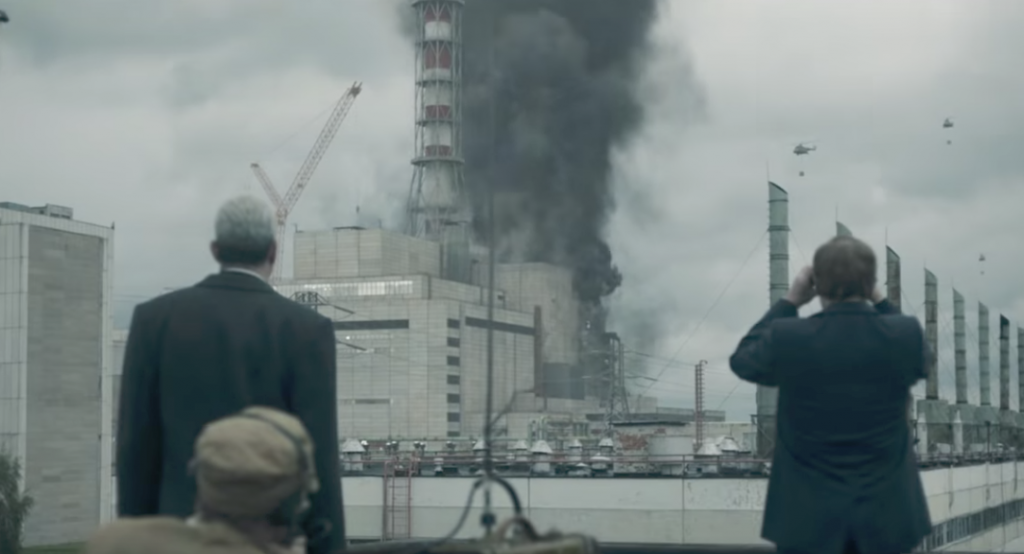Series : Chernobyl
This is an HBO series that is unquestionable about the events of the year, with its apocalyptic atmosphere, its flames, its thousands of deaths, its political stakes, etc. But here, no dragons or thrones, only an invisible death that consume more or less slowly its victims.
The qualities of the series are needed from the first scenes. First, there is reconstitution. By the grayish photography, by the small details, by the acting, we are completely immersed in the USSR of the 80s. It’s so good that the use of the English language is absolutely not. This reconstruction is not only a matter of accessories. Soviet policy is also perfectly reconstructed, with its cult of secrecy and its ideological blindness that are evidently training.
The Assembly, Chernobyl imposes itself as the tragedy of a people, a drama filmed on a human scale, but also the symbol of its USSR in disintegration. Chernobyl, that is to say, it is a murder crushed by a titanic bureaucracy, which itself can only exist through its dogmas and its ideology (has it really changed?) . Or, the dominant ideology is that the nuclear industry is infallible. Ergo, the heart of the drug could not burst, it was impossible. This is a woman, a nuclear engineer, whoever he is, he has been seen on the contrary with his own eyes and at the expense of his health, and although he is too tired to know it. intentions towards the noble Soviet state. Even the meters, when they dismantle a rate of dangerous radiations, are necessarily wrong: it is bad equipment, do you understand …

The disaster shows how much the country collapsed first and foremost because of its own internal functioning. A 1975 report shows that this type of plant can have uncontrollable reactions? What does it matter, we make disappear the report (and its author?) And thus, one makes disappear the problem. Gorbachev himself is shown to be more concerned with the country’s image abroad than with the security of its people. It was only because Swedes found abnormally high radiation rates that the truth could no longer be hidden. And it was only because the Western media turned their cameras to the Vladimir I. Lenine power plant and its gaping hole that the central power finally decided to evacuate the surrounding cities. In the opening scene, Legassov (formidable Jared Harris, impeccable, sober and intense, as the series as a whole), in his famous recordings, raises the question of responsibility.
Of course, an official was named, in this case Anatoli Diatlov, the chief engineer of the plant; he took ten years in prison, did five, and then … justice is done? (Again, would it be different here nowadays?) (In this sense, one must of course mention the dark irony or the disgusting cynicism of this red flag hoisted on the famous chimney, as if a victory had been led by the Soviet Union where it is only responsible for thousands. in any case, this red flag hovers over the power plant as if to proudly say “I did it!”)
This sobriety makes the drama all the more intense. And Chernobyl is terrifyingly intense. The realization manages to make palpable this invisible threat of the irradiation. Every time a character approaches the power station, every time a firefighter, a miner, an engineer or a soldier risks his life by walking in contaminated water or rejecting radioactive debris, one feels in us- even the deadly burn. The realization manages to find an ideal balance between what to show and what to suggest: we see two or three men rotting on their hospital bed, makeup is superb, but the realization does not insist more than it takes.
Basically, to show that there is a danger, to say what it really consists of (hence this scene where Legassov explains in detail what an irradiation produces in the human body) in order to better focus on the fate of the people. who sacrificed themselves (or who were sacrificed) by facing this danger. This gives scenes of extreme tension, at the limit of the unbearable: an engineer forced by his hierarchy to lean over the gaping reactor, a few hours after the explosion, to verify that there is indeed a hole; three employees of the power station who, knowingly, accept to immerse themselves in highly radioactive water to prevent a second explosion; the soldiers requisitioned to go throwing debris …
Conclusion
It is the permanence of this invisible but terrifying threat that gives the show its most unsustainable scenes. Clearly, here we have one of the best horror films of recent years, in the sense that the viewer can feel in him the nuclear terror. Terrifying too, and precisely because everything is true, sober and efficient. In fact, the documentation work is extraordinary. The actors are exceptional. And we could multiply the superlatives for a long time. The few narrations that arise from time to time are minor compared to the excellence of the whole. At the same time political reflection, description of a tragedy, tribute to the victims, Chernobyl is what could imagine better on such a subject.


